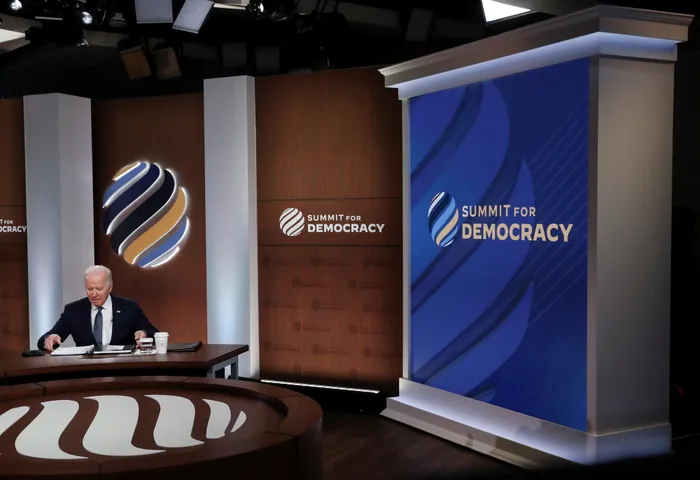Democracy Summit: Africa’s disdain for West’s ‘lecture on democracy’

Picture: Leah Millis/REUTERSUS – President Joe Biden at the start of a virtual summit with leaders from democratic nations at the State Department's Summit for Democracy, at the White House, in Washington, US, December 9, 2021.
By David Monyae
Zambia together with four other countries namely the United States, Costa Rica, the Netherlands and South Korea will host the second instalment of the Summit for Democracy, a brainchild of the US President Joe Biden.
The first Summit for Democracy was hosted by the US in December 2021 where more than 100 participating countries pledged to take action to promote and defend democracy around the world. President Biden was of the view, in light of the January 6, 2021, events that took place in Washington, that democracy was under threat hence his mobilisation of other leaders from democratic countries to protect democracy from authoritarianism.
A joint statement from the co-hosting governments claimed that the summit will demonstrate how democracies deliver for their citizens and have the capacity to tackle some of the world’s biggest challenges.
The statement goes on to identify challenges undermining democracy such as wars, climate change, societal mistrust and technological developments while insisting that democracy remains best placed to deliver peace, prosperity, and justice.
The African leg of the summit, which will be attended by civil society and private sector players, will be held under the theme “Free, fair and transparent elections in Africa”. About 16 African governments have confirmed their participation in the summit including the Democratic Republic of Congo, Botswana, South Africa and Nigeria.
The quest to promote democracy in Africa is a follow-up on the US Strategy Towards Sub-Saharan Africa, which was released by the US government in August 2022. Some of the objectives that the US will pursue in its relationship with Africa as outlined in the Strategy document include fostering open societies and delivering democratic and security dividends.
The document states that “The United States will seek to stem the recent tide of authoritarianism and military takeovers by working with allies and partners in the region to respond to democratic backsliding and human rights abuses, including through a targeted mix of positive inducements and punitive measures such as sanctions.”
At the US-Africa Leaders’ Summit in December 2022, President Biden reiterated the US commitment to improving and building democracy in the continent and announced the establishment of the African Democratic and Political Transition initiative. He further pledged that his government will “invest $75 million to strengthen transparent, accountable governance; facilities — facilitate voter registration; support constitutional reform; and more”.
As such, the US seems to be heavily invested in building strong relations with Africa through entrenching democratic norms.
However, it is not clear if this is the best course of action for the US to pursue if it stands a chance of reclaiming its influence on the Continent, which has been on the decline during much of the 21st century.
The underwhelming subscription to the upcoming summit by African governments, with only 16 out of the Continent’s 54 governments confirming participation, is perhaps the clearest sign yet that playing the democratic card may not reassure optimal outcomes in terms of Washington’s re-engagement of Africa.
African leaders have repeatedly expressed their disdain at receiving lectures on democracy from western countries. For example, referring to the West’s penchant to preach about democracy, the Ugandan President Yoweri Museveni was quoted as saying that he found it “quite comic and laughable to hear some actors in the world giving us lectures about democracy”.
His Rwandan counterpart Paul Kagame was also not impressed with the West’s democratisation crusade. He said: “Some of the friends we deal with in the West. They come with this mindset that Africa is indifferent to human rights, to democracy, to freedom so they come to do it for us… And we are saying, ‘No’. No human being anywhere would want to live by dictates by someone else.”
The West’s insistence on democracy is seen as interference in internal political processes ultimately aimed at undermining the sovereignty and independence of African countries. It is important that the US and its allies understand that African leaders are inclined more towards bread-and-butter issues and tangible things like critical infrastructure, which Africa urgently needs for its socio-economic development.
This is not to argue that elections and democracy are not important. It is to point out rather, that if the US’s drive to revive its relations with Africa is to be effective, then it must also pay attention to and acknowledge the priorities of African leaders.
An ‘Infrastructure Summit’ would have caught the interest of more African leaders than the democracy summit has done. President Joe Biden’s Partnership for Global Infrastructure and Investment (PGII) which was announced at the Group of 7 Summit in June 2022 is an initiative that he could leverage with better outcomes in his African re-engagement drive. African countries have been exposed over the years to more effective alternative modes of co-operation with other major powers that have yielded substantial development dividends. It is up to the US to read the room.
David Monyae is Associate Professor of International Relations and Political Science, and Director of the Africa-China Studies Centre at the University of Johannesburg
This article is exclusive to The African. To republish, see terms and conditions.